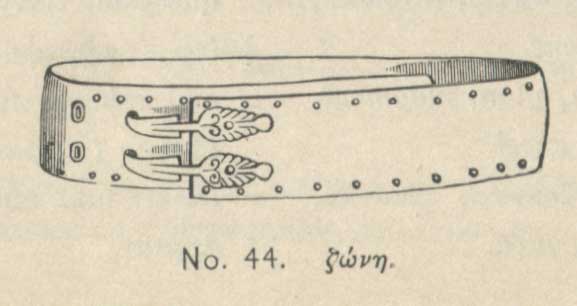THE FIRST GREEK BOOK
BY JOHN WILLIAMS WHITE, PH.D, LL.D., LITT.D.
Professor Of Ancient Greek At Harvard University
This Revision Copyright ©2012 by Shawn Irwin
Lesson LXIII - Future and First Aorist Systems of Liquid Verbs. Interrogative Subjunctive, Indirect Discourse
S582. Verbs whose stems end in a liquid (λ μ ν ρ) are called liquid verbs (273).
S583. Conjugate the future system of φαίνω, show, in 771.
Give its synopsis in the active; in the middle.
S584. The future of liquid verbs is formed by adding the tense suffix εο/ε instead of
σο/ε (553, 2) to the stem; ε is contracted with the following vowel,
as in the present of ποιέω (782). Thus, μένω (μεν), remain,
future μενῶ, μενεῖς μενεῖ, etc; φαίνω (φαν), show, future
φανῶ, φανεῖς φανεῖ, etc.
S585. Conjugate the first aorist system of φαίνω, show, in 772.
Give its synopsis in the active; in the middle.
S586. The first aorist system of liquid verbs rejects σ of the tense
suffix σα (553, 3) and lengthens the stem vowel in compensation, α to η
(but to ᾱ after ι or ρ), ε
to ει, ι to ῑ, υ to ῡ. Thus,
φαίνω (φαν), show, ἔφηνα; κτείνω (κτεν),
kill, ἔκτεινα; κρίνω (κριν), judge, ἔκρῑνα, etc.
S587.
1. τί πράξω; (aorist subjunctive);
What shall I do?
2. τὸν ἄνδρα ἀποκτείνωμεν;
Shall we put the man to death?
3. μὴ πέμπωμεν τοὺς πελταστάς;
Shall we not send the peltasts?
Each of these sentences is interrogative; its principal verb is in the first person of the subjunctive; if negative, it takes μὴ.
S588. The first person of the subjunctive may be used in questions of appeal, where a person asks
himself or another what he is to do. The negative is μὴ.
S589.
1. ἀπορεῖ τί (or ὅ τι) πράξῃ.
He is at a loss what to do.
2. ἠπόρει τί (or ὁ τί) πράξειε (or πράξῃ),
He was at a loss what to do.
The interrogative subjunctive here quoted, after a primary tense, changes neither its mood nor its tense ;
after a secondary tense, the subjunctive may become optative.
S590. Αfter a primary tense, an interrogative subjunctive, when indirectly quoted, retains both its mood and tense. after a secondary
tense, it is either changed to the same tense of the optative or retained in the same tense of the subjunctive.
S591. VOCABULARY.
ἀγγέλλω, (ἀγγελ), ἀγγελῶ, ἤγγειλλα, ἤγγελκα, ἤγγελμαι, ἠγγέλθην,
(compare ἄγγελος), announce, report.
ἀπαγγέλλω, bring back word, report.
ἀποκρίνομαι, middle. deponent, give a decision, answer.
ἀπὸκτείνω, kill off, put to death.
ἀπoφαίνω, show forth; middle, show ones own, declare, express.
βάλλω, (βαλ), βαλῶ, ἔβαλον, βέβληκα, βέβλημαι, ἐβλήθην, throw, throw at, hit with stones, stone.
γνώμη, ης, ἡ, opinion, plan, judgment.
ἐκβάλλω, throw out, expel.
κάω, (καυ), καύσω, ἔκαυσα, κέκαυκα, κέκαυμαι, ἐκαύθην, burn.
κρίνω, (κριν), κρινῶ, ἔκρῑνα, κέκρικα, κέκριμαι, ἐκρίθην, divide, distinguish, decide, judge.
κτείνω, (κτεν), κτενῶ, ἔκτεινα, ἔκτονα, kill.
μένω, μενῶ, ἔμεινα, μεμένηκα, remain, stay, wait for, last.
πότερον . . . ἤ, whether . . . or, in an alternative question (both direct and indirect); also, in an indirect
question, εἰ . . .ἤ, whether .. or.
φαίνω, (φαν), φανῶ, ἔφηνα, πέφαγκα and πέφηνα, πέφασμαι, ἐφάνθην
and ἐφάνην, (compare φανερός), bring to light, show; middle and
passive, show oneself, appear.
Give the original forms of the indirect quotations and questions in the following exercise (592).
S592.
1. πότερον ταῦτα ἀπαγγελεῖ ἠ μενεῖτε;
2. σὺ δὲ πρῶτος ἀπόφηναι τὴν γνώμην.
3. ἐθαύμασαν δὲ πάντες ὅ τι οἱ ἄλλοι Ἕλληνες ἀποκρινοῖντο.
4. ἀποροῦμεν εἰ καύσωμεν τὰς ἀμάξᾱs ἃς ἔχομεν.
5. τοὺς μὲν αὐτῶν ἀποκτενεῖ, τοὺς δ᾽ ἐκβαλεῖ.
μὲν, some, others (815)
6. ἐβουλεύοντο εἰ τοὺς ἄνδρας κτείνειαν ἢ μή.
The original question was, πότερον τοὺς ἄνδρας κτείνωμεν ἠ μὴ;
7. οὐ μέντοι ταχὺ ἀγγελῶ, ἀλλὰ διατρίψω.
8. καὶ Κλέαρχος κρίνᾱς ἀδικεῖν τὸν τοῦ Μένωνος στρατιώτην ἔπαιεν.
9. ἡγεμὼν οὐδεὶς ἠμῖν φανεῖται.
10. Κῦρος δ᾽ ἀπεκρίνατο ὅτι ἀκούοι τὸν σατράπην ἐπὶ τῷ Ἑυφράτῃ ποταμῷ εἶναι.
11. ὁ δ᾽ ἐβουλεύετο εἰ μένοιεν ἠ πορεύοιντο ἐπὶ τὰς σκηνάς.
12. παίσειν φᾱσὶ τὸν ἄνθρωπον τοῦτον καὶ βαλεῖν, ἐὰν μὴ πορεύηται.
S593.
1. The gods will show us the way.
2. There Cyrus put a Persian to death.
3. He was considering what answer to make.
He said to himself, τί ἀποκρίνωμαι;
4. They were at a loss whether or not to show themselves.
They said to themselves, πότερον φηνώμεθα ἢ μή;
5. There they remained a week and collected supplies for their journey.

S594. Answer of Cyrus.
ἀκούσᾱς ταῦτα τοῦ Γαυλίτου ἔλεξεν ὁ Κῦρος˙ "Ἀλλ᾽
ἔστι μὲν ἡμῖν, ὦ
ἄνδρες, ἡ ἀρχὴ ἡ πατρῴᾱ πρὸς μὲν μεσημβρίᾱν
μέχρι οὗ διὰ καῦμα οὐχ
οἶοί τ᾽ εἰσὶν οἰκεῖν ἄνθρωποι, πρὸς δὲ ἄρκτον μέχρι οὖ διὰ
χειμῶνα˙ τα᾽
δ᾽ ἐν μέσῳ τούτων πάντα σατραπεύουσιν οἰ τοῦ ἀδελφοῦ φίλοι. ἦν δʼ
ἡμεῖς νῑκήσωμεν, ἡμᾶς δεῖ τοὺς ἡμετέρους φίλους τούτων ἐγκρατεῖς
ποιῆσαι."
Γαυλίτου: verbs of hearing (cf. 846) may take an accusative of the thing heard, and a
genitive of the person heard from as the source (851).
ἔστι: for the accent, see 166.
ἡμῖν: dative of advantage (861).
μεσηβρίᾱν: literally, midday (μέσος, + ἡμέρᾱ), i.e. the south.
μέχρι οὗ: literally, to what (point), i.e. to the point where, neuter of the relative ὅς, with
μέχρι used as a preposition (until).
καῦμα: heat. compare κάω.
χειμῶνα: cold, compare χιών.
τὰ . . . πάντα: all between these (limits).
τούτων: with ἐγκρατεῖς (855).
See the route on the map.
End Of Chapter
INDEX
Chapter 64
HOME
This Revision Copyright ©2012 by Shawn Irwin
